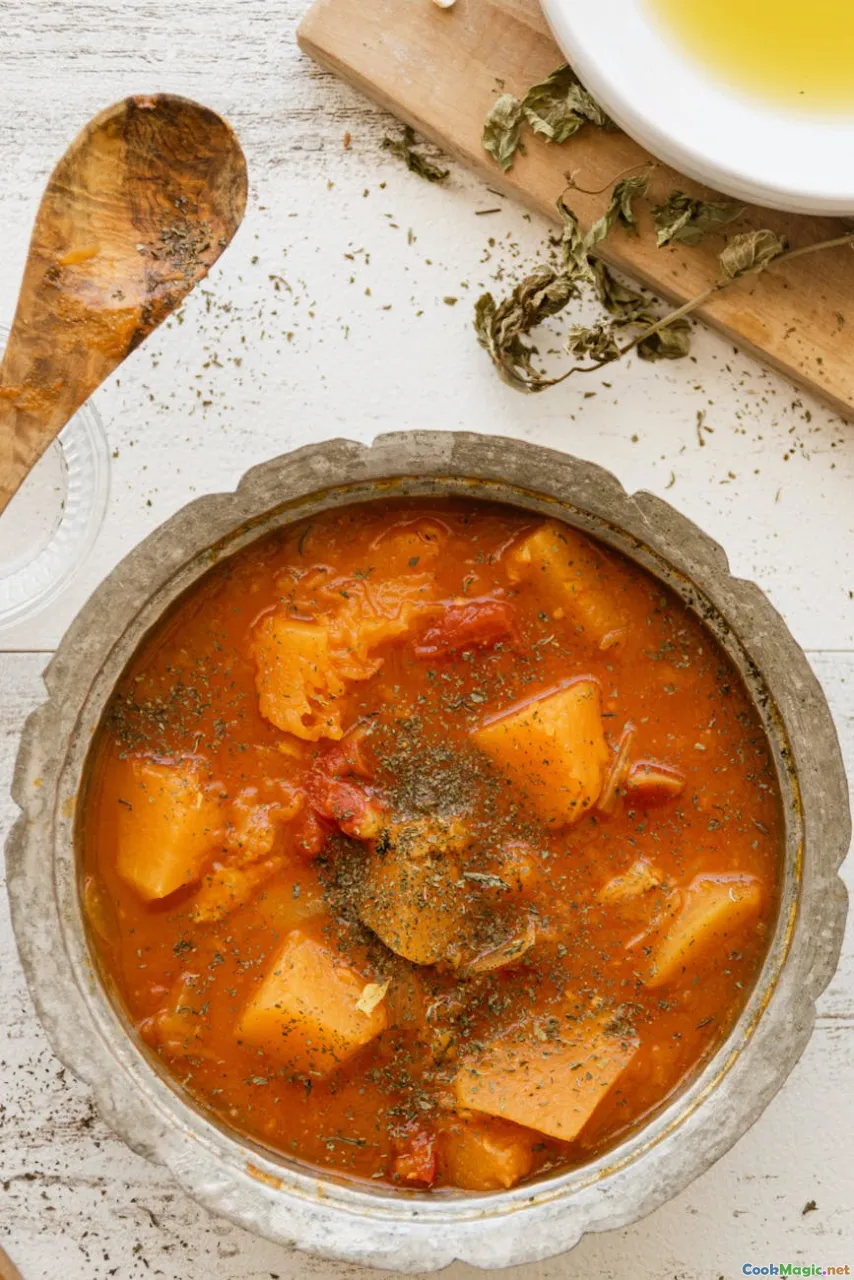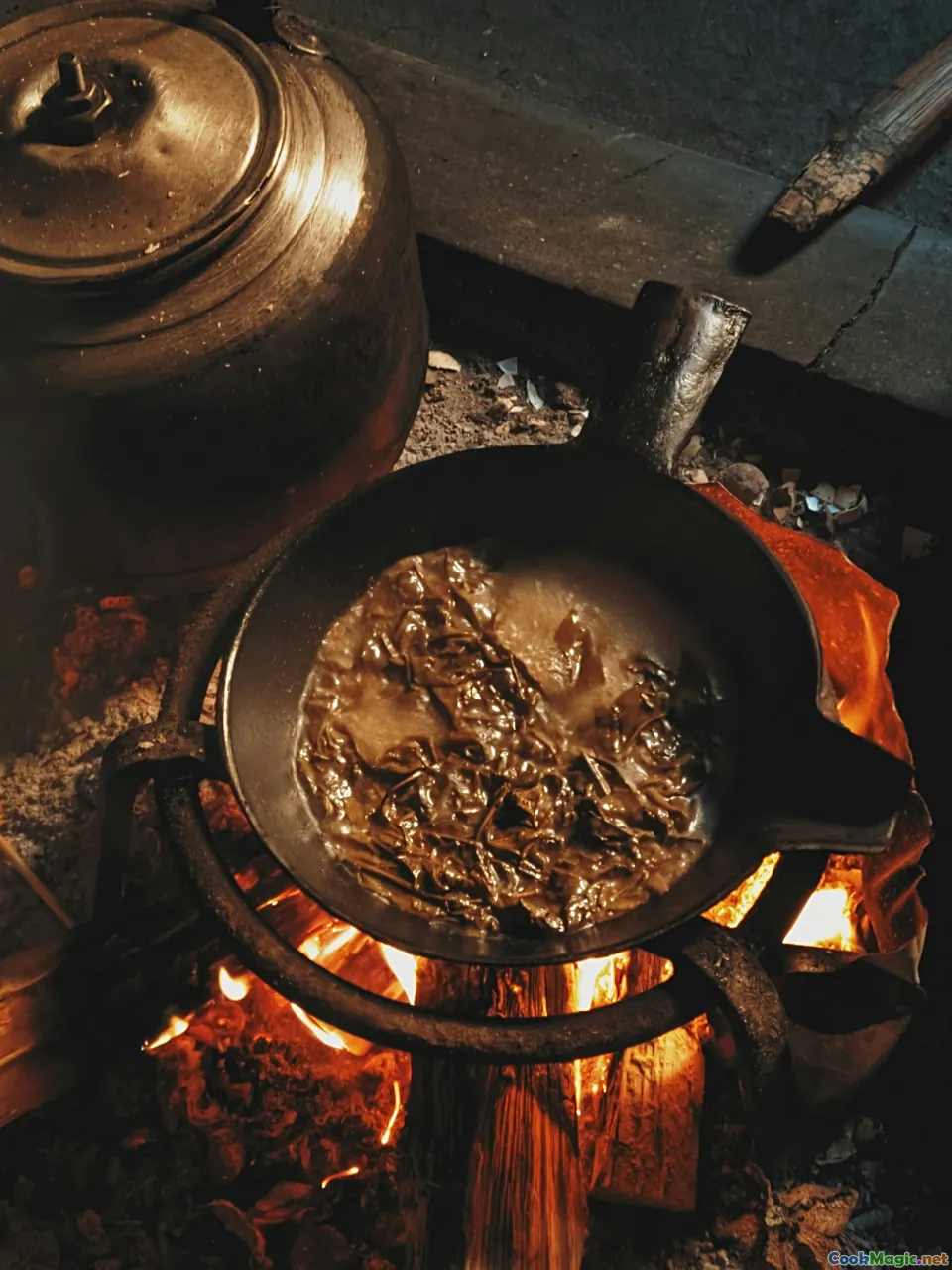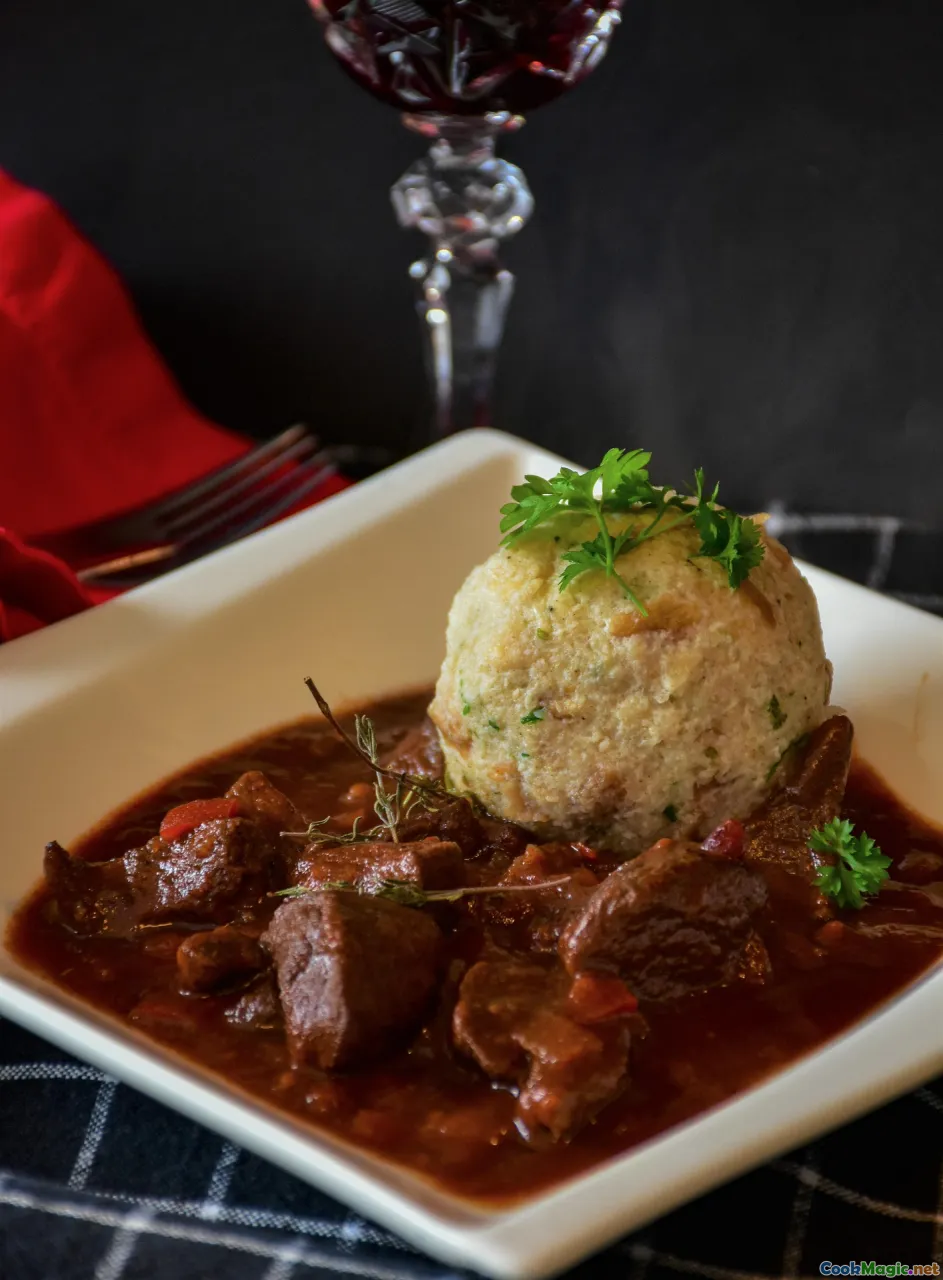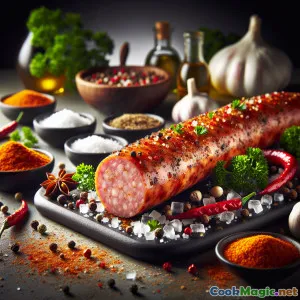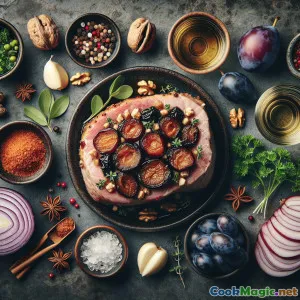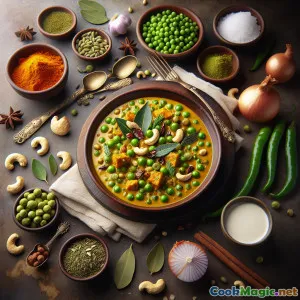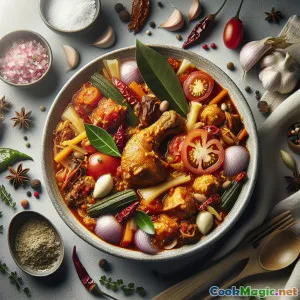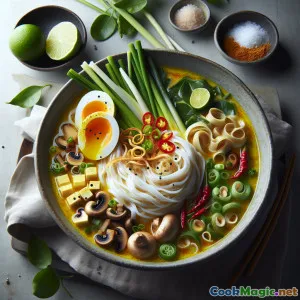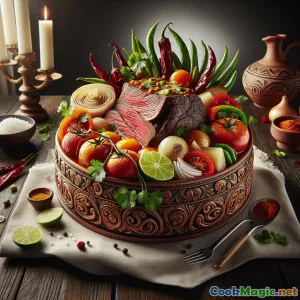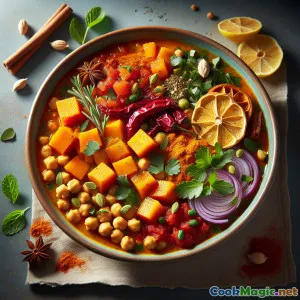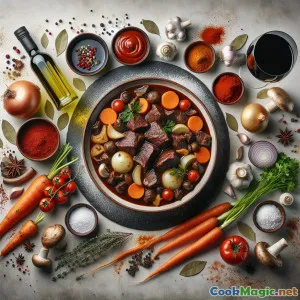
Šumadija 사냥꾼의 굴라시: 야생 세르비아 스튜 레시피
(Šumadija Hunter’s Goulash: Wild Serbian Stew Recipe)
(0 리뷰)재료
-
800 grams 사슴고기 (또는 멧돼지)
(Use cubed meat, well-trimmed)
-
2 large 노란 양파
(잘게 썬)
-
2 medium 당근
(주사위 모양으로 자른)
-
1 large 파스닙
(주사위 모양으로 자른)
-
5 pieces 마늘 쪽
(Minced or pressed)
-
100 grams 신선하거나 말린 야생 버섯
(Such as porcini or ceps)
-
3 tbsp 달콤한 파프리카
(Preferably Hungarian)
-
1 tsp 매운 파프리카
(맛에 맞게 조절하세요)
-
2 tbsp 토마토 페이스트
-
200 ml 레드 와인
(Dry; can substitute with water if needed)
-
6 pieces 주니퍼 베리
(Crushed; optional, enhances wild flavor)
-
2 pieces 월계수 잎
-
1 tbsp 신선한 타임
(Chopped; or 1 tsp dried)
-
2 tsp 소금
(맛에 따라)
-
1 tsp 흑후추
-
2 tbsp 식물성 기름 또는 돼지기름
(Traditional: pork lard)
-
2 tbsp 평잎 파슬리
(곱게 다진 것, 장식용)
(Use cubed meat, well-trimmed)
(잘게 썬)
(주사위 모양으로 자른)
(주사위 모양으로 자른)
(Minced or pressed)
(Such as porcini or ceps)
(Preferably Hungarian)
(맛에 맞게 조절하세요)
(Dry; can substitute with water if needed)
(Crushed; optional, enhances wild flavor)
(Chopped; or 1 tsp dried)
(맛에 따라)
(Traditional: pork lard)
(곱게 다진 것, 장식용)
영양 정보
- 인분: 4
- 1인분 크기: 1 hearty bowl (400g)
- Calories: 445 kcal
- Carbohydrates: 18 g
- Protein: 39 g
- Fat: 22 g
- Fiber: 5 g
- Sugar: 6 g
- Sodium: 990 mg
- Cholesterol: 98 mg
- Calcium: 53 mg
- Iron: 5.1 mg
조리법
-
1 - Prepare and Brown the Meat:
Pat the meat dry. In a heavy-bottomed pot, heat lard or oil over medium-high. Add venison cubes in batches, browning on all sides. Remove and set aside.
-
2 - Sauté Vegetables:
Lower heat to medium, add onions, carrots, and parsnip. Cook until onions are soft and lightly golden, scraping any bits from the pan.
-
3 - Build Aromatics and Spices:
Stir in garlic, sweet/hot paprika, thyme, and crushed juniper berries. Cook 1 minute until fragrant. Add mushrooms and tomato paste, sauté 3 more minutes.
-
4 - Deglaze and Simmer:
Return seared meat to the pot. Pour in the wine, stirring up browned bits. Let wine reduce by half (approx. 4 mins).
-
5 - Slow Cooking:
Add bay leaves, salt, pepper, and enough water to cover meat by 2cm. Bring to a light simmer; cover and cook gently for 2 hours, stirring occasionally, until meat is tender.
-
6 - Finalize and Serve:
Remove bay leaves. Adjust seasoning. Spoon into bowls, garnish with fresh parsley and serve with rustic bread or creamy mashed potatoes.
Pat the meat dry. In a heavy-bottomed pot, heat lard or oil over medium-high. Add venison cubes in batches, browning on all sides. Remove and set aside.
Lower heat to medium, add onions, carrots, and parsnip. Cook until onions are soft and lightly golden, scraping any bits from the pan.
Stir in garlic, sweet/hot paprika, thyme, and crushed juniper berries. Cook 1 minute until fragrant. Add mushrooms and tomato paste, sauté 3 more minutes.
Return seared meat to the pot. Pour in the wine, stirring up browned bits. Let wine reduce by half (approx. 4 mins).
Add bay leaves, salt, pepper, and enough water to cover meat by 2cm. Bring to a light simmer; cover and cook gently for 2 hours, stirring occasionally, until meat is tender.
Remove bay leaves. Adjust seasoning. Spoon into bowls, garnish with fresh parsley and serve with rustic bread or creamy mashed potatoes.
Šumadija 사냥꾼의 굴라시: 야생 세르비아 스튜 레시피 :에 대한 자세한 정보
Sumadijski Lovacki Gulas: Tradition from Serbia’s Forested Hills
Sumadijski Lovacki Gulas, or the Sumadija Hunter's Goulash, is more than a dish—it is a portal to the foggy forests and rustic woodlands of Serbia’s Sumadija region. The area, marked by rolling hills and dense thicket, is revered for its abundance of game, wild herbs, and mushrooms—a landscape that not only shapes the flavors but also fuels the culinary imagination of its people.
The Hunter’s Tale
Serbian hunters, often away for days stalking boar or deer, would prepare this dish at the forest edge, using anything tendered by nature—and their campfire. Traditionally, a gulas was slow-cooked in a massive cauldron over the embers, employing every trick to stretch game meat into deeply savory sustenance among friends and kin.
At its heart, this goulash celebrates wild flavors: succulent venison or boar, aromatic wild mushrooms (often foraged that very morning), onions, generous paprika, juniper berries, and a robust dose of hearty red wine. Each of these ingredients lends a deeply local, earthy character, resulting in a stew that is as warming as it is spirited. The sweet bite of root vegetables mirrors flame-kindled memories, while a tumble of parsley at serving exemplifies Balkan generosity.
Culinary Notes & Unique Aspects
- Choice of Meat: Venison is classic, though wild boar stands equally well. Robust beef can substitute for those unable to source game. The key is hard-searing the meat for intense flavors.
- Mushrooms: Wild forest mushrooms give an untamed edge. Dried porcini is widely available worldwide and provides exceptional umami (if fresh finds are limited).
- Paprika: Quality really matters—Hungarian or Serbian paprikas, both sweet and hot, provide color and smoky sweetness.
- Juniper Berries: An optional hunter’s touch that accentuates game flavors.
- Red Wine: Deepens and enriches—though water suffices if abstaining or serving to children.
- Slow Cooking Technique: The slow braise guarantees fall-apart softness, coalescing the flavors. It’s well worth the long simmer—consider using a thick-bottomed Dutch oven.
Making It Personal
Perhaps the best thing about this gulas: it invites improvisation. Each hunter has a secret. Add diced red bell peppers for a peppery aroma, swap in potatoes for a thicker body, or even add a pinch of caraway. Bread, polenta, or creamy mashed potatoes form the perfect canvas, much as they have for generations in Serbian mountain homes.
Historical & Cultural Significance
Sumadija, whose name is derived from Šuma (meaning “forest”), lies at Serbia's cultural crossroads. Hunting has always melded necessity and tradition here, especially given the country’s mountainous, resource-rich terrain. The hunter’s goulash is nigh omnipresent—at festivals, family birthdays, late-autumn gatherings, or slavas (Saint’s days)—it stokes conviviality.
The ritual of making Lovacki gulas parallels communal hunting: men stir heavyweight pots, telling tales. The hours-long simmer is emblematic of patience, reward, and bonding—inevitably met at meal’s end with laughter and shared rakija toasts.
Tips & Personal Thoughts
- Strongly consider cooking the day before serving—flavors in wild game goulash intensify beautifully overnight.
- Use a heat diffuser (or low oven) to avoid scorching in the final hours.
- Like true hunters' meals, do not rush: the secrets rest in slow coalescence.
- Great with ajvar (roasted red pepper spread) or simply alongside sharp pickles.
Sumadijski Lovacki Gulas exemplifies Balkan resourcefulness, respect for nature’s gifts, and the unmatched luxury of patient, soul-filling cooking. It brings the deep woods to every kitchen—and, with each spoonful, the tales of our ancestors back to life.

